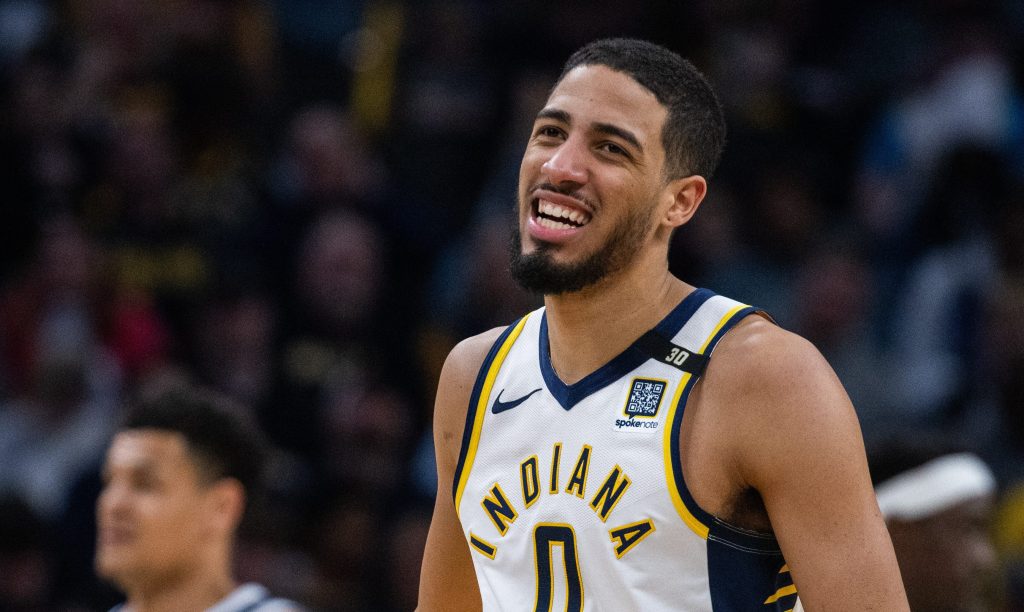
Tyrese Haliburton understands there’s a lot to juggle when you’re a high-level professional athlete.
Between the fame, fortune and the pressure to perform in front of millions of people every night, it can all be overwhelming. That’s why it’s essential for athletes to talk to someone who listens to them as human beings—someone like a professional psychologist who shows they value them beyond their extremely public-facing job.
According to Haliburton, having a person like this available is critical when he has to do things like face the insensitivity of some sports bettors.
In a video from James Boyd of The Athletic, the Indiana Pacers star discussed his successful experiences with a sports psychologist and how they’ve helped build his self-esteem and self-worth. It shouldn’t be ignored that he chose to highlight sports betting as a problem that helps demean athletes like him:
I also asked #Pacers star Tyrese Haliburton specifically about speaking to a sports psychologist, and he noted in his response how sports betting has consumed a lot of his social media.
“To half the world, I’m just helping them make money on DraftKings or whatever. I’m a prop.“ pic.twitter.com/6f2a0vEuiK
— James Boyd (@RomeovilleKid) March 20, 2024
Here’s Haliburton’s full, insightful quote about the occasional toxicity sports bettors present to him as an NBA All-Star and why it’s good to have someone more relatable to talk to:
“It’s important for us as basketball players, as men, to get those things out because not everybody cares to hear how we feel … to half the world, I’m just helping them make money on DraftKings … I’m a prop, that’s what my social media mostly consists of. It’s important for us to have someone to talk to.
“And all of that stuff can be funny sometimes when someone’s [a sports bettor] like … ‘I lost $1,000’ … I don’t give a [expletive] … I do think it’s important for us to have conversations with people who really value us as human beings. It’s not just sports psychologists. It’s our teammates, loved ones, and people who really look out for our well-being.”
Haliburton’s thoughts are poignant and critical to unpack for all of us sports-obsessed people.
Beyond betting or any similar investment, we have to remember the people we’re watching on fields and courts are still … people. They still deserve basic human decency and respect like anyone else. Their status and fame shouldn’t change that. There is a limit on what emotions we should and shouldn’t project on strangers we don’t even know in real life. Yelling with joy at a big play on our couch or at a game in real life? Heck yes. That’s what this (gestures broadly) is all about. Jumping into an athlete’s social media direct messages or heckling them in person? Oh, no, no, that’s crossing a line.
It should never get to the point where they’re being demeaned for things almost entirely out of their control. They deserve to be in public spaces like anyone else — be it on social media or while walking around without being harassed.
This is an inherent problem behind the worst sides of sports fandom, and it isn’t new. It’s up to us to be rational, logical and grounded in response to something we mostly watch on our televisions, to understand we aren’t owed anything by “spectacle” or entertainment. There is an often unstated social contract between us fans and athletes that we need to honor more. And it’s our responsibility to call out people who don’t do so. We can’t just accept it as a baked-in reality. Full stop.
With all of that said, I think it’s interesting and worth noting that Haliburton specifically highlights sports betting as a particularly toxic element of sports fandom.
The sports betting market has proliferated seemingly exponentially in recent years. You can build out ambitious six, seven, and eight-leg parlays. You can live bet on your phone with the tap of a few fingers. Multiple American sports leagues, including the NBA have openly embraced the concept, even introducing references to it during live broadcasts of their respective games.
It is this sort of constant access to dopamine and instant gratification through an emotional outlet like sports fandom that has probably exacerbated meanness and frustration for toxic fans. To be absolutely clear, it does not happen to everyone. But it does happen enough to have a frank conversation about. It is the thing right now. Because of that, it’s likely no coincidence Haliburton chooses to use an example of sports bettors debasing him as an athlete. It might be the most common kind of pointed comment directed toward him by people who he feels often only see him as an outlet for “easy” money.
I’m happy to hear Haliburton has been seeing a sports psychologist. I’m happy it’s helped him deal with the tremendous burden of being an active NBA superstar. He deserves that. I’m not happy to hear him highlight the toxicity of sports fans and sports bettors who don’t value athletes beyond them putting a ball in a tall hoop.
We need to be better — all of us.